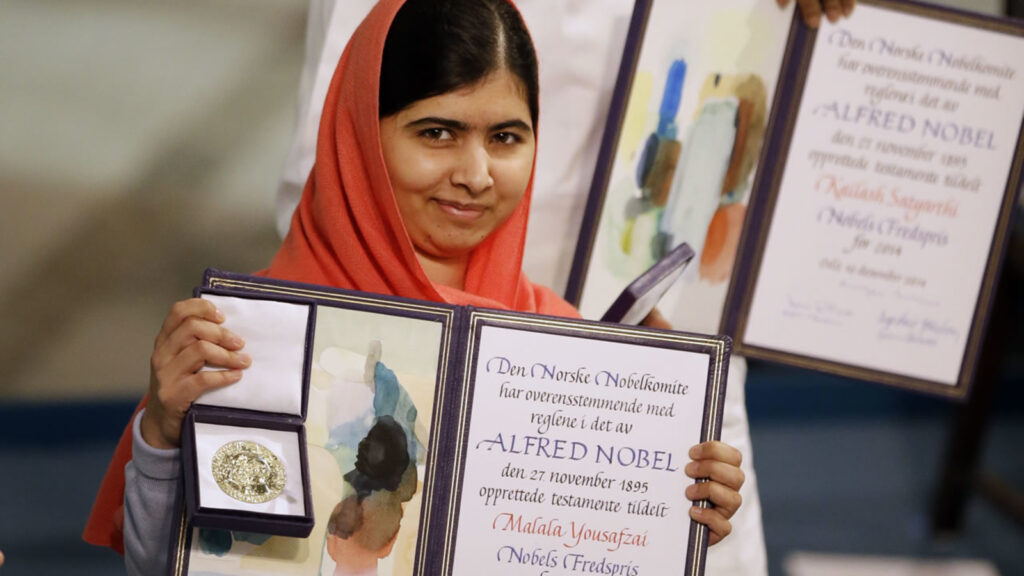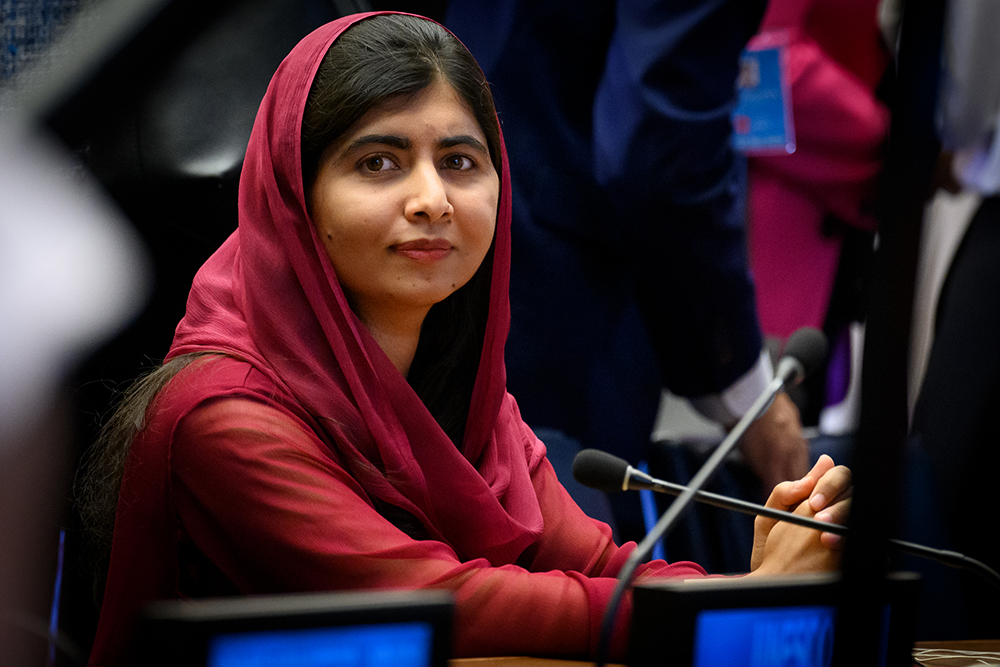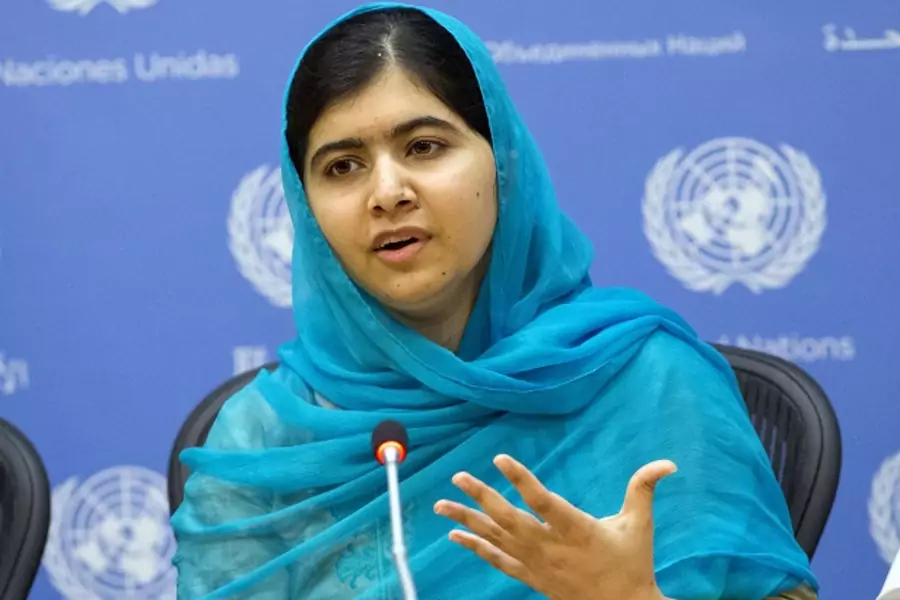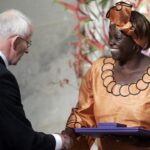Malala Yousafzai is a Pakistani female education activist and the youngest person to win the Nobel Peace Prize at the age of 17. She won the prize in 2014, becoming the second Pakistani and the first Pashtun to receive a Nobel Prize. Malala advocated for educating women and children in Pakistan Where the Taliban had banned girls from attending school. Her advocacy has grown into an international movement after the Taliban attempted to assassinate her by shooting her in the head. She survived and according to former Prime Minister Shahid Khaqan Abbasi, became Pakistan’s “most prominent citizen”.
Early life
Malala Yousafzai was born on 12 July 1997 in the Swat District of Pakistan She is the daughter of Ziauddin Yousafzai and Toor Pekai Yousafzai. She was primarily educated by her father, Ziauddin Yousafzai, a poet, school owner, and an educational activist himself, running a chain of private schools known as the Khushal Public School.
In 2007, the Taliban began to control the Swat Valley and quickly became the dominant socio-political force throughout much of northwestern Pakistan. Girls were banned from school, and cultural activities like dancing and watching television were prohibited. Suicide attacks were widespread, and the group made its opposition to proper education for girls a cornerstone of its terror campaign. By the end of 2008, the Taliban had destroyed some 400 schools.
Inspired by the twice-elected, assassinated Prime Minister Benazir Bhutto, Malala started speaking about education rights as early as September 2008, when her father took her to Peshawar to speak at the local press club. “How dare the Taliban take away my basic right to education?” she asked in a speech covered by newspapers and television channels throughout the region.
In early 2009, Malala started to blog anonymously on the Urdu language site of the British Broadcasting Corporation (BBC). She wrote about life in the Swat Valley under Taliban rule and about her desire to go to school. Using the name “Gul Makai,” she described being forced to stay at home, and she questioned the motives of the Taliban.
Malala was 11 years old when she wrote her first BBC diary entry. Under the blog heading “I am afraid,” she described her fear of a full-blown war in her beautiful Swat Valley and her nightmares about being afraid to go to school because of the Taliban.
Early activism
In May 2009, after the Pakistani Army moved into the region to regain control during the Second Battle of Swat. The Region was evacuated and Yousafzai’s family was displaced and separated. Her father went to Peshawar to protest and lobby for support, while she was sent into the countryside to live with relatives.
While away from the Swat region, Malala used the media and continued her public campaign for her right to go to school. Her voice grew louder, and over the course of the next three years, she and her father became known throughout Pakistan for their determination to give Pakistani girls access to a free quality education. Her activism resulted in a nomination for the International Children’s Peace Prize in 2011. That same year, she was awarded Pakistan’s National Youth Peace Prize.
In 2011, Malala trained with the local girls’ empowerment organization, Aware Girls, run by Gulalai Ismail, whose training included advice on women’s rights and empowerment to peacefully oppose radicalization through education. By 2012, she was planning to organize the Malala Education Foundation, which would help poor girls go to school.
Read More:
- Wangari Maathai: The First African Woman To Win The Nobel Peace Prize
- Africans that has won the NobelPrize for literature
- Ellen Johnson Sirleaf: First Female President In Africa
Murder attempt
As Malala Yousafzai became more recognized, the dangers facing her increased. Death threats against her were published in newspapers and slipped under her door. On Facebook, where she was an active user, she began to receive threats. Eventually, a Pakistani Taliban spokesman said they were “forced” to act. In a meeting held in the summer of 2012, Taliban leaders unanimously agreed to kill her.
On 9 October 2012, a Taliban gunman shot Malala as she rode home on a bus after taking an exam in Pakistan’s Swat Valley. She was 15 years old at the time. According to reports, a masked gunman shouted: “Which one of you is Malala? Speak up, otherwise, I will shoot you all.” Upon being identified, She was shot with one bullet, which entered and exited her head and lodged in her shoulder. Two other girls were also wounded in the shooting: Kainat Riaz and Shazia Ramzan.
Malala was seriously wounded. That same day, she was airlifted to a Pakistani military hospital in Peshawar and four days later to an intensive care unit in Birmingham, England. Once she was in the United Kingdom, Malala was taken out of a medically induced coma. Though she would require multiple surgeries, including repair of a facial nerve to fix the paralyzed left side of her face, she had suffered no major brain damage. After weeks of treatment and therapy, Malala was able to begin attending school in Birmingham.
Continued Activism and Nobel Peace Prize
After the shooting, her incredible recovery and return to school resulted in a global outpouring of support for Malala. On July 12, 2013, her 16th birthday, Malala visited New York and spoke at the United Nations. Later that year, she published her first book, an autobiography entitled “I Am Malala: The Girl Who Stood Up for Education and Was Shot by the Taliban.” On October 10, 2013, in acknowledgment of her work, the European Parliament awarded Malala the prestigious Sakharov Prize for Freedom of Thought.
In 2014, through the Malala Fund, the organization she co-founded with her father, Malala traveled to Jordan to meet Syrian refugees, to Kenya to meet young female students, and finally to northern Nigeria for her 17th birthday. While in Nigeria, she spoke out in support of the abducted girls who were kidnapped earlier that year by Boko Haram, a terrorist group.
In October 2014, Malala, along with Indian children’s rights activist Kailash Satyarthi, was announced as the co-recipient of the 2014 Nobel Peace Prize for her struggle against the suppression of children and young people and for the right of all children to education. Malala having received the prize at the age of 17, became the youngest person to win the Nobel Peace Prize. She is however the second Pakistani to receive a Nobel Prize after 1979 Physics laureate Abdus Salam.




